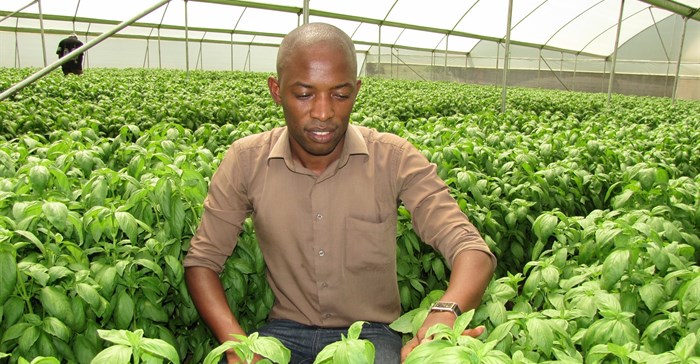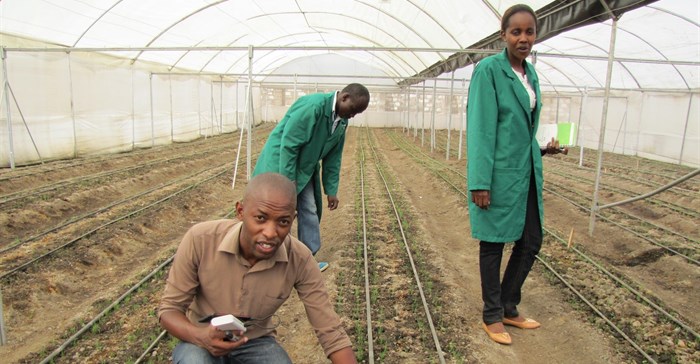
Premier Seed was born as a seeds company, importing and selling Open Pollinated Varieties and hybrid seeds that bring innovation and higher yields to African farmers. We immediately started giving full post-buy support to our clients in order to build a sustainable and long-term knowledge on modern agriculture practices.
Our vision of rationalisation and modernisation of small-scale farming in Kenya found its higher realisation with the implementation of herbs farming for the international market. This intensive farming is carried on with modern practices, both on the open field and in greenhouses, that maximise the yield potential, strictly controls the use of water and chemicals and gives farmers a reliable and sustainable source of income. We feel honoured to have pointed our farmers to high-value crops that are giving them decent incomes and changing their lives in remarkable ways, a departure from the past.
The biggest challenge in Nakuru County, but also in the whole country, is the lack of financing. Shifting to modern agriculture practices, such as drip irrigation, requires investment that small-scale farmers don’t easily get access to. Premier Seed is able to guide farmers though this process, both providing financial support and assuring the link to a reliable market.
The second biggest challenge is the inadequacy of knowledge when it comes to specific and delicate produces such as herbs. For this reason, when we contract farmers, we assure them of full technical support and supervision.
Access to finance, knowledge and markets are not necessarily a guarantee of success: a new whole mentality must be adopted. The first shift has to be towards openness to what is new and innovative: new produce, new ways to approach farming practices and a new dedication that perseveres even when things don’t reach the expectations from the beginning.
The second important change is an overall rationalisation of all aspects of farming - from planning to record keeping, a rationalisation of all the processes is essential to pursue long-term plans. Big goals cannot be achieved in short periods. A farmer who really wants to build a long-term, sustainable and safe wealth for their family requires planning, rationalisation, and the capacity to see beyond the immediate future.
The last but most important thing is cooperation. Kenyan (and African) agriculture risks being completely dominated by big producers that limit the chances of emerging and small-scale farmers. Most of our economic culture is polluted by individualism, egoism and often greed; only through collaboration will farmers be able to reach higher achievements. Premier Seed is an example of that: we coordinate small-scale farmers that, only through working together, are able to access the international market. Moreover, within our projects, the most successful stories are those of cooperating farmers that got together and overcame all obstacles.
Premier Seed makes sure that all the people that work with us have the necessary knowledge to manage this kind of production. We provide materials and support (training in the office, using modern means like Facebook and photos on Whatsapp) in a continuous process of learning until our growers have built a solid capacity.

The Entrepreneurship programme of Tony Elumelu is Pan-African, hinged on the belief that startups and entrepreneurs hold the key to economic liberalisation and growth in Africa by creating jobs and a conducive environment where home-grown pan-African companies in various sectors can flourish. This it does through business skills training, mentoring, access to seed capital funding, information, and membership in its Africa-wide alumni network.
As an alumni of the programme, I have had the pleasure to interact with likeminded agripreneurs in Africa, and industry players. The training I have undertaken have been key in advancing what we do at Premier Seed. I have brought key lessons to our company and the farmers I work with, and we have seen huge benefits including farmers’ mind shift in taking agriculture as a business venture. We believe that is the precursor to economically empowered citizenry and economies considering agriculture contributes on average 25 percent to the national purses of most African countries.
After establishing ourselves in the seeds market, we realised that we were able to make a step forward toward modernisation and high revenue commercial crops. After meeting some farmers that were producing chives, we started looking for buyers in the European market and soon established important connections though which we created our first herb project.
The process for this innovation is often not smooth and simple. A lot of new practices, analysis and planning are required. Nonetheless, producers have achieved satisfying results.
The criteria that we use mostly rely on the analysis we do on the soil and on the climate in the area in which we operate. We then evaluate the experience of the farmers we work with and the availability of crops for cultivation in order to start projects that don’t go beyond the capacities of the farmers. We also consider organisation and logistics to ensure convenience, especially when dealing with fresh produce. Such logistics include transport and proximity to transport networks, especially roads.
Premier Seed believes that small-scale farming can potentially play the greatest role in lifting African households' condition and living standards while growing the continental economy. More and more young people are turning towards agriculture as a way of creating financial security and wealth; exploiting this phenomenon will be the only way to satisfy, in a sustainable way, the growing demand for food on the continent and feed the 2.3 billion Africans of 2050.
These are interesting times. Women are becoming more economically empowered and more youth are finding fortunes in farming, inspiring more into a sector that was regarded as only belonging to the aged. But such success stories are still few. The fate of small-scale farmers is not fully held in their own hands. Too much still relies on government policies (education, taxes, bureaucracy, etc.), poor infrastructure (roads, research, and communication) and access to financing.
It will be essential that governments seriously tackle these overwhelming challenges, otherwise, we will witness only the growth of large and industrial commercial production. By embracing small-scale farmers into its operations, Premier Seed is rubberstamping the creed. Numerous studies have cited that smallholder food producers are key in assisting Africa become the agricultural powerhouse of the world, comfortably capable of feeding itself and the globe.
